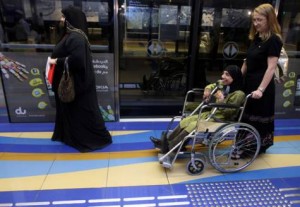By Ashfaq Ahmed, Chief Reporter www.gulfnews.com
Dubai: The Dubai Metro’s facilities for people with special needs were put to the test on Tuesday with the help of “special” volunteers from all over the UAE.

Although most facilities provided to help passengers with special needs were praised by the volunteers, they pointed out some “barriers” which they feel should be removed to ensure a hassle-free journey.
The volunteers from the Ministry of Social Affairs completed the full journey using the facilities. They went through the whole process of buying Nol cards to embarking and disembarking and coming out of stations before filling out a questionnaire given to them by the RTA to get their feedback.
“Facilities for ‘special passengers’ are excellent within the stations and the trains, but the access and exit areas on the roads need urgent improvement as they are dangerous for handicapped people,” said Kaltham Obaid Bakheer Al Matroushi, Manager of the Ladies Section at Al Thiqah Club for the Handicapped.
Kaltham was among the 13 volunteers who were invited to participate in the study organised by the Rail Agency of the Dubai Roads and Transport Authority to identify gaps in the Metro’s special needs facilities.
Good initiative
She said that it was a good initiative to involve the special needs people to use the system and evaluate its efficiency.
“Since we [the special needs people] believe in the slogan ‘nothing for us without us”, the initiative will help improve the system, making it special needs friendly.
She said that trains should have seat belts in the areas reserved for wheelchairs of special needs passengers to make them feel safe in the moving trains.
Manar Abdul Qadir, a visually impaired person, said that a tactile guidance path is not available at the Terminal 3 station at the airport. Also, she said that the tactile guidance does not lead passengers like her to the Gold Class or women only coaches.
Badriya, a hearing impaired teacher, said that at least one of the staff members at each station should understand sign language to deal with passengers like her. “It is difficult to communicate with the staff to seek any help or guidance,” she said.
Speaking to Gulf News, Abdul Redha Abu Al Hassan, Director of Rail Planning and Development at the RTA, said that the study being conducted by the Rail Agency aimed to further improve the special needs facilities.
“People from all segments of society have to use the public transport to understand it and get used to it,” he said.
Though the exact number of people with special needs is not available, Al Hassan said the facilities should be there even if there is only one person with a disability using the Metro.
He said the stations are designed with a “barrier-free access system” to make the Metro accessible to all regardless of any physical impairment following best international practices.
Facilities like Braille and tactile guidance paths are available to visually impaired passengers while wheelchair-bound passengers are able to proceed freely to the trains.



















